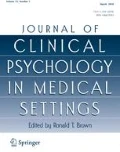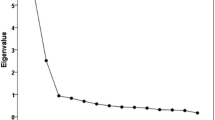Abstract
A growing body of literature suggests that individuals who face life-threatening situations turn to religion to help them cope. Religion has been cited as the most frequently used resource to cope with stressful events (K. I. Pargament, 1997). The present study was the first to investigate the religious coping methods of patients with lung disease who are awaiting transplant and to identify which coping methods are associated with distress and disability. The study was an exploratory, cross-sectional analysis of 90 patients with end-stage pulmonary disease who were being evaluated for transplant. Results indicated that religiosity was highly prevalent. Patients employed a combination of religious coping efforts, but mostly used coping methods considered “positive.” Patients with late-onset pulmonary diseases used religious coping strategies more frequently than patients with cystic fibrosis. Hierarchical regression analyses identified a subset of religious coping strategies that predicted 27%, 14%, and 34% of the unique variance in depression, overall disability, and psychosocial disability, respectively.
Similar content being viewed by others
REFERENCES
Anderson, R. N., & Smith, B. L. (2003). Deaths: Leading causes for 2001. National Vital Statistics Reports, 52(9), 1–85.
Beck, A.T., Epstein, N., Brown,G., & Steer, R.A. (1988).Aninventory for measuring clinical anxiety: Psychometric properties. Journal of Consulting and Clinical Psychology, 56(6), 893–897.
Beck, A., & Steer, R. (1987). Beck Depression Inventory Manual.San Antonio, TX: Harcourt Brace
Beck, A. T., Ward, C. H., Mendelson, M., Mock, J., & Erbaugh, J. (1961). An inventory for measuring depression. Archives of General Psychiatry, 4 ,561–571.
Bergner,M., Bobbitt, R., Carter,W.,& Gilson, B. (1981). The Sickness Impact Profile: Development and final revision of a health status measure. Medical Care, 19 ,787–805.
Bickel, C. O., Ciarrocchi, J. W., Sheers, N. J., Estadt, B. K., Powell, D. A., & Pargament, K. I. (1998). Perceived stress, religious coping styles, and depressive affect. Journal of Psychology and Christianity, 17 ,33–42.
Bright, J., Craven, J., Kelly, P., & The Toronto Lung Transplant Group. (1990). Assessment and management of psychosocial stress in lung transplant candidates. Health and Social Work, 15 ,125–132.
Brooks, W. B., Jordan, J. S., Divine, G. W., Smith, K. S., & Neelon, F. A. (1990). The impact of psychologic factors on measurement of functional status. Medical Care, 28 ,793–804.
Bumberry, W., Oliver, J. M., & McClure, J. N. (1978). Validation of the Beck Depression Inventory in a university population using psychiatric estimate as the criterion. Journal of Consulting and Clinical Psychology, 46 ,150–155.
Burker, E. J., Carels, R. A., Thompson, L. F., Rodgers, L., & Egan, T. (2000). Quality of life in patients awaiting lung transplant: Cystic fibrosis versus other end-stage lung diseases. Pediatric Pulmonology, 30 ,453–460.
Cohen, J. (1988). Statistical power analysis for the behavioral sciences (2nd ed.). Hillsdale, NJ: Erlbaum.
Craven, J. L., Bright, J., & Dear, C. L. (1990). Psychiatric, psychosocial, and rehabilitative aspects of lung transplantation. Clinics in Chest Medicine, 11 ,247–257.
Egan, T., Detterbach, F. C., Mill, M. R., Gott, K. K., Rea, J. B., McSweeney, J., et al. (1998). Lung Transplantation for cystic fibrosis: Effective and durable therapy in a high-risk group. Annals of Thoracic Surgery, 66 ,337–346.
Fox, C. A., Blanton, P. W., & Morris, M. L. (1998). Religious problem-solving styles: Three styles revisited}. Journal of the Scientific Study of Religion, 37(4), 673–677.
Fox, R. B. (2002). Religious identity, religious practices, and spiritual coping in adults undergoing treatment for cancer. Dissertation Abstracts International, Section B, The Sciences and Engineering, 62(10-B), 4783.
Gall, T. L., Miquez de Renart, R. M., & Boonstra, B. (2000). Religious measures in long-term adjustment to breast cancer. Journal of Psychosocial Oncology, 18, 21–37.
Geertsma, A., Ten Vergert, E. M., Bonsel,G. J., de Boer, W. J., & van der Bij, W. (1998). Does lung transplantation prolong life? A comparison of survival with and without transplantation. The Journal of Heart and Lung Transplantation, 17 ,511–516.
Handelsman, H. (1991). Single and double lung transplantation (Health Technology Assessment Report No. 5.). Rockville, MD: Agency for Health Care Policy and Research.
Harris, R. C., Dew, M. A., Lee, A., Amaya, M., Buches, L., Reetz, D., et al. (1995). The role of religion in heart transplant recipients' long-term health and well-being. Journal of Religion and Health, 34, 17–32.
Harrison, M. O., Koenig, H. G., Hays, J. C., Eme-Akwari, A. G., & Pargament, K. I. (2001). The epidemiology of religious coping: A review of the recent literature. International Review of Psychiatry, 13 ,86–93.
Jenkins, R. A., & Pargament, K. I. (1995). Religion and spirituality as resources for coping with cancer. Journal of Psychosocial Oncology, 13 ,51–74.
Kendler, K., Gardner, C., & Prescott, C. (1997). Religion, psychopathology, and substance use and abuse: A multimeasure, genetic-epidemiologic study. American Journal of Psychiatry, 154 ,322–329.
Koenig, H., Hays, J., George, L., Blazer, D., Larson, D., & Landerman, L. (1997). Modeling the cross-sectional relationships between religion, physical health, social support, and depressive symptoms. American Journal of Geriatric Psychiatry, 5 ,131–144.
Koenig, H., Larson, D., & Larson, S. (2001). Religion and coping with serious medical illness. Annals of Pharmacotherapy, 35 ,352–359.
Koenig, H.G. (2002). Religion, congestive heart failure, and chronic pulmonary disease. Journal of Religion and Health, 41,263–278.
Koenig, H. G., Cohen, H. J., Blazer, D. G., Kudler, H. S., Krishnan, K. R. R., & Sibert, T. E. (1995). Religious coping and cognitive symptoms of depression in elderly medical patients. Psychosomatics, 36 ,369–375.
Koenig, H. G., George, L. K., & Peterson, B. L. (1998). Religiosity and remission of depression in medically ill older patients. American Journal of Psychiatry, 155 ,536–542.
Koenig, H.G., Pargament, K. I., & Nielsen, J. (1998). Religious coping and health status in medically ill hospitalized older adults. Journal of Nervous and Mental Diseases, 186 ,513–521.
Religious Coping and Pulmonary Disease 193
Levin, J. S., & Chatters, L. M. (1998). Religion, health, and psychological well-being in older adults: Findings from three national surveys. Journal of Aging and Health, 10 ,504–531.
MacKenzie, C. R., Charlson, M.E., DiGiola,D., & Kelley,K. (1986). Can the sickness impact profile measure change? An example of scale assessment. Journal of Chronic Diseases, 39 ,429–438
Miner, M. H., & McKnight, J. (1999). Religious attributions: Situational factors and effects on coping. Journal for the Scientific Study of Religion, 38 ,274–286.
Murphy, P., Ciarrocchi, J., Piedmont, R., Cheston, S., Peyrot, M., & Fitchett, G. (2000). The relation of religious belief and practices, depression, and hopelessness in persons with clinical depression. Journal of Consulting and Clinical Psychology, 68 ,1102–1106.
Pargament, K. I. (1997). The psychology of religion and coping: Theory, research, practice. New York: Guilford.
Pargament, K. I., Cole, B., Vandecreek, L., Belavich, T., Brant, C., & Perez, L. (1999). The vigil: Religion and the search for control in the hospital waiting room. Journal of Health Psychology, 4 ,327–341
Pargament, K. I., Koenig, H. G., & Perez, L. M. (2000). The many methods of religious coping: Development and initial validation of the RCOPE. Journal of Clinical Psychology, 56 ,519–543.
Pargament, K. I., Smith, B. W., Koenig, H. G., & Perez, L. (1998). Patterns of positive and negative religious coping with major life stressors. Journal for the Scientific Study of Religion, 37 ,710–724
Powell, L. H., Shahabi, L., & Thoresen, C. E. (2003). Religion and spirituality: Linkages to physical health. American Psychologist, 58(1), 36–52.
Rabinowitz, B., & Florian, V. (2002). Chronic obstructive pulmonary disease-psychosocial issues and treatment goals. Social Work Health Care, 16 ,69–86
Saleh, U., & Brockopp, D. (2001). Hope among patients with cancer hospitalized for bone marrow transplantation. Cancer Nursing, 24 ,308–314.
Spielberger, C. D. (with Gorsuch, R. L., Lushene, R., Vagg, P. R., & Jacobs, G. A.). (1983). Manual for the State-Trait Anxiety Inventory.Palo Alto, CA: Mind Garden.
SRTR/UNOS. (2002). 2002 Annual Report of the U.S. Scientific Registry of Transplant Recipients and the Organ Procurement and Transplantation Network: Transplant Data 1992-2002. Rockville, MD and Richmond, VA: HHS/HRSA/OSP/DOT and UNOS.
Van Ede, L., Yzermansm, C., & Brouwer, H. (1999). Prevalence of depression in patients with chronic obstructive pulmonary disease: A systematic review. Thorax, 54 ,688–692.
Author information
Authors and Affiliations
Rights and permissions
About this article
Cite this article
Burker, E.J., Evon, D.M., Sedway, J.A. et al. Religious Coping, Psychological Distress and Disability Among Patients with End-Stage Pulmonary Disease. Journal of Clinical Psychology in Medical Settings 11, 179–193 (2004). https://doi.org/10.1023/B:JOCS.0000037612.31730.56
Issue Date:
DOI: https://doi.org/10.1023/B:JOCS.0000037612.31730.56



